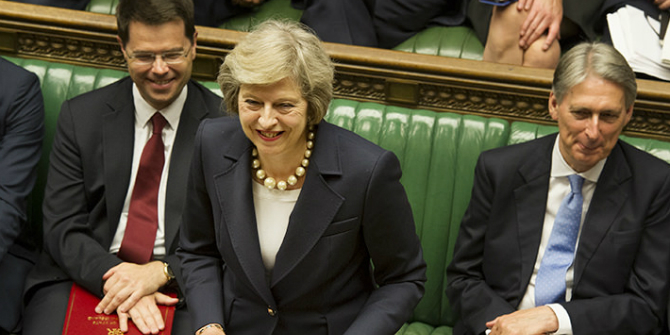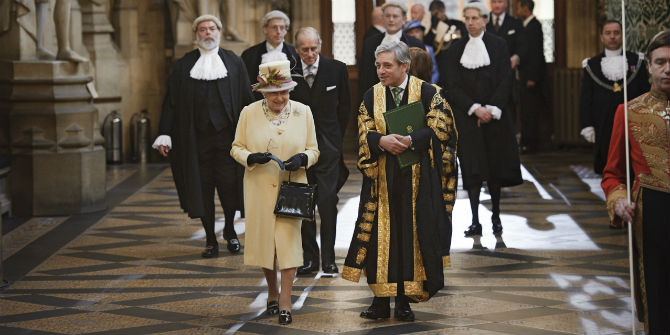 As agreement is reached with the EU, Theresa May’s Brexit deal will come before Parliament. In this blog, Benjamin Martill (LSE) breaks down the parliamentary arithmetic and assesses her options.
As agreement is reached with the EU, Theresa May’s Brexit deal will come before Parliament. In this blog, Benjamin Martill (LSE) breaks down the parliamentary arithmetic and assesses her options.
My Kingdom for a Deal
Theresa May has, at long last, reached agreement with the EU on the terms of Britain’s impending withdrawal from the Union on 29 March 2019. Although details of the deal are hazy at the moment, most sources indicate it loosely follows the logic of the infamous Chequers Agreement presented to the Cabinet in July. It would see the UK remain within a single customs territory with the EU, precluding the need for a hard border on the island of Ireland. Northern Ireland would also remain in key elements of the single market for goods, for the same reason. This ‘backstop’ has proven to be the most contentious element of the Withdrawal Agreement, dragging out negotiations which were almost 80 percent complete at the beginning of 2018.
The agreement would also provide for a reasonably generous agreement on citizens’ rights, British contributions to the EU budget to the tune of £39 billion, as well as a 21-month transition period, during which the UK will remain subject to EU rules but cease to be represented in the institutions.
The deal represents a milestone in many ways, not least since the two sides in the talks have seemed quite far apart and rumours were rife that the government would fall before a deal could be reached. But May should not count her chickens yet (chlorinated or otherwise).
Reaching agreement with the EU on the terms of withdrawal was always going to be the easy part, not least given the amount of ground the UK has given in the negotiations so far, and the dearth of concessions offered by the EU in relation to British demands. Far more tricky will be obtaining the necessary support of the British parliament, which must consent to the final agreement in the ‘meaningful vote’ promised by May in June. In this regard, it is instructive to consider what the different constituencies in the British Parliament have at stake, how they are likely to vote, and how this will affect May’s parliamentary calculus.
 Photo by UK Parliament/ Jessica Taylor via Creative Commons BY-NC 2.0
Photo by UK Parliament/ Jessica Taylor via Creative Commons BY-NC 2.0
Mixed Messages
Few MPs support May’s deal for what it is—a messy compromise amounting to the worst of both worlds that cannot but displease Leavers and Remainers alike. Rather, they will support it if they feel it is the least-worst option, or because they feel offering or withholding support will create favourable circumstances in other respects. Much hinges on whether rejection of the deal increases the likelihood of a harder Brexit (including the no deal scenario), whether it challenges Brexit and forces a re-think, and whether it will result in a general election (and a shot at power for the opposition).
To her party faithful, a combination of Remain- and moderate-Leave supporting Tory MPs, May must stress the risk of a no deal scenario and the possibility of a Labour government. To the small but potentially significant number of Remain-supporting Tory rebels—including Kenneth Clarke, Anna Soubry, and as many as 20 others if past votes are anything to go by—she must also stress the risk of a no deal Brexit or a harder Brexit under her would-be successors.
To the 40 or so Brexit-supporting members of the European Research Group (ERG), as well as supporters of former Cabinet colleagues Boris Johnson and David Davis, she must emphasise the risk to Brexit itself of rejecting the deal. In essence, her message to this group must be that Brexit will not be realised if her withdrawal agreement does not pass. She can also hope to obtain the support of this group by citing the spectre of a Labour government, whose version of Brexit, she could legitimately claim, would also be far softer than the ERG preference.
To Labour MPs, many of whom are Remain supporters, the prime minister must cite both the likelihood of a harder Brexit and make it clear a general election would not be in the offing if the agreement were to fail. If Labour MPs can be persuaded that the withdrawal agreement offers the most realistic chance to avert a no deal Brexit, and that Labour could not come to power off the back of its rejection, then a number may be prepared to defy the party whip and vote with the government. The party firmly denies this, but it cannot be ruled out, not least because of divisions within Labour ranks (occluded only because the Conservatives are even more divided).
With respect to her coalition colleagues, the Brexit-supporting Democratic Unionist Party (DUP), May has relatively few options. She can argue that Brexit will not happen at all, but this would likely be of secondary concern to the party’s overall preference of keeping Northern Ireland undifferentiated from the UK. May cannot threaten the DUP with the loss of (real) power, nor can she threaten that Labour’s Brexit plans would thwart unionist ambitions, since these involve continued membership of the customs union for the whole UK. In the end, the DUP will not prove as pivotal as first thought, given the incentives for MPs in other parties to cross the aisle, as well as the serious risk of revolt within May’s own party.
Deal or No Deal
The real challenge for May is to make any of these potentialities credible in light of the multiple possibilities she herself has cited in recent weeks. Unless she can convince every group that their worst fears will be realised should they reject the deal, the vote on the withdrawal agreement will fail. But tactics meant to scare some audiences will enable revolt in others: the more May doubles down on the risk of a no deal or hard Brexit to court Remain-supporting MPs, the more hard-line Conservatives will be prepared to defy the government whip; the more she cites the risk of a Labour government, the less likely it is that any Labour MPs will come to her aid; the more she raises the prospect of Brexit not happening at all, the more Remain-supporting MPs will seek to oppose the withdrawal agreement.
If any of these constituencies withdraws their support, the agreement will fail.
In the end, the prime minister may just pull it off. She may succeed in convincing each group that the alternative is far worse. Either way, the vote is not going to be easy, and if the agreement does pass, it will likely be with a razor-thin majority, which will do little to legitimise the deal and much to ensure that political divisions will continue to play out as the future relationship is negotiated.
This post represents the views of the author and neither those of the LSE Brexit blog nor of the LSE. It first appeared on the Dahrendorf Forum blog.
Benjamin Martill is a Dahrendorf Forum Post-Doctoral Fellow at the London School of Economics.







So basically May has to blackmail everyone into voting for this garbage to avoid a no deal scenario and all because this Government gave everything away to the EU and received nothing in return